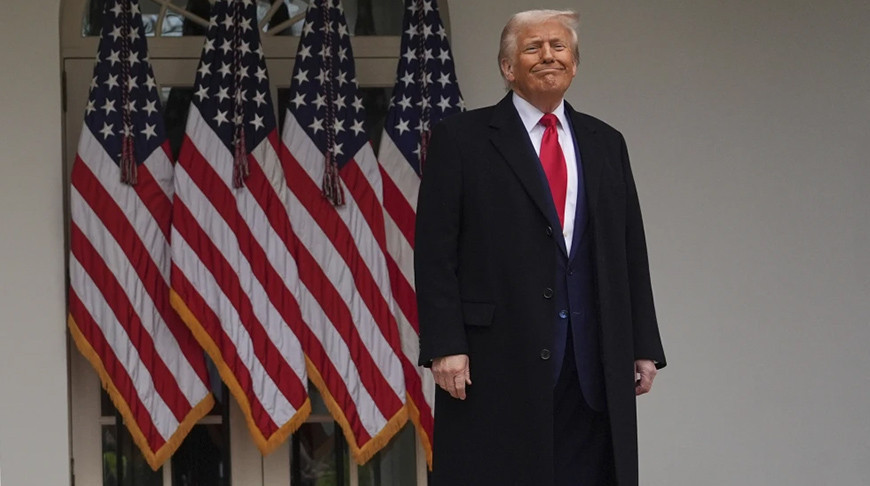
Major stock markets in Europe and Asia dropped sharply after Monday's opening bell. Global markets were already in a freefall at the end of the previous week when U.S. President Donald Trump announced trade tariffs ranging from 10% to 50% on about 180 countries. Trump tariffs sowed fears of a global trade war, which could lead to a large-scale financial crisis.
Today, world stock exchanges are showing extreme uncertainty. Investors are confused, traders are looking for a “safe harbor” while experts are experiencing a cognitive dissonance.
“Investors are trying to read the tea leaves on Trump and all the retaliation risks but they are just impossible to read. People are really scared of what is going on,” currency trader Mingze Wu at financial services firm StoneX told Bloomberg.
Following Trump’s tariff announcement stocks tumbled, taking the three-day (3, 4 and 7 April) wipeout in global equity value to about $9.5 trillion.
“It starts to feel as if the market is getting into a ‘sell now, ask questions later’ kind of mood,” said Stephan Kemper, chief investment strategist at BNP Paribas Wealth Management.
European stocks plunged to a 16-month low on Monday as investors grappled with the possibility of a recession. The pan-European STOXX 600, which is a broad measure of the European equity market, slumped 5.8%, after registering its steepest percentage decline since the COVID-19 pandemic.
Indices tumbled on stock exchanges in the UK, Germany, France and Italy. German index Dax, French CAC 40 and Italian FTSE MIB sank about 6% at the beginning of today's trading. The London Stock Exchange's FTSE 100 index went down 5.51%.
The Moscow Exchange Index (IMOEX2) was below 2,700 points this morning (down 3%) for the first time since 25 December 2024.
The situation on Asian stock markets is no better. Japanese Nikkei 225 index fell by almost 7%, Hong Kong Hang Seng - by 13%, Shanghai Composite - by 7.3%, Indian Nifty 50 - by 5%. The Republic of Korea even suspended the trading due to a sharp drop in the Kospi index.
Australia’s ASX 200 shed $10 billion in the biggest one-day fall in the past five years. The Australian dollar fell to its lowest level since April 2020.
This is the lowest level in four years. The drop in prices is caused not only by Trump's tariffs but also by the OPEC+ agreement to increase oil output and Saudi Arabia's decision to cut prices for its Asian buyers.
The decline in oil prices has sent shares of major oil and gas companies into a tailspin: British Petroleum tumbled 5% and Shell lost almost 6%.
Following the oil price trend, gas prices also sank. At the auctions held today, the price of 1,000 cubic meters of gas in Europe dropped below $400.
The financial storm has also affected the cryptocurrency market. Bitcoin plummeted by over 10% to less than $75,000 for the first time since November 2024.
Vita Khanataeva,
Today, world stock exchanges are showing extreme uncertainty. Investors are confused, traders are looking for a “safe harbor” while experts are experiencing a cognitive dissonance.
“Investors are trying to read the tea leaves on Trump and all the retaliation risks but they are just impossible to read. People are really scared of what is going on,” currency trader Mingze Wu at financial services firm StoneX told Bloomberg.
Following Trump’s tariff announcement stocks tumbled, taking the three-day (3, 4 and 7 April) wipeout in global equity value to about $9.5 trillion.
“It starts to feel as if the market is getting into a ‘sell now, ask questions later’ kind of mood,” said Stephan Kemper, chief investment strategist at BNP Paribas Wealth Management.
European stocks plunged to a 16-month low on Monday as investors grappled with the possibility of a recession. The pan-European STOXX 600, which is a broad measure of the European equity market, slumped 5.8%, after registering its steepest percentage decline since the COVID-19 pandemic.
Indices tumbled on stock exchanges in the UK, Germany, France and Italy. German index Dax, French CAC 40 and Italian FTSE MIB sank about 6% at the beginning of today's trading. The London Stock Exchange's FTSE 100 index went down 5.51%.
The Moscow Exchange Index (IMOEX2) was below 2,700 points this morning (down 3%) for the first time since 25 December 2024.
The situation on Asian stock markets is no better. Japanese Nikkei 225 index fell by almost 7%, Hong Kong Hang Seng - by 13%, Shanghai Composite - by 7.3%, Indian Nifty 50 - by 5%. The Republic of Korea even suspended the trading due to a sharp drop in the Kospi index.
Australia’s ASX 200 shed $10 billion in the biggest one-day fall in the past five years. The Australian dollar fell to its lowest level since April 2020.
Prices for oil continued to decline. The price of futures contracts of Brent crude oil for June 2025 delivery dropped by 4.5% reaching $62.6 per barrel on London's ICE.
This is the lowest level in four years. The drop in prices is caused not only by Trump's tariffs but also by the OPEC+ agreement to increase oil output and Saudi Arabia's decision to cut prices for its Asian buyers.
The decline in oil prices has sent shares of major oil and gas companies into a tailspin: British Petroleum tumbled 5% and Shell lost almost 6%.
Following the oil price trend, gas prices also sank. At the auctions held today, the price of 1,000 cubic meters of gas in Europe dropped below $400.
The financial storm has also affected the cryptocurrency market. Bitcoin plummeted by over 10% to less than $75,000 for the first time since November 2024.
European defense companies' stocks saw significant losses due to concerns that U.S. tariffs might upend supply chains in the industry. The German tank and ammunition maker Rheinmetall AG slid as much as 27%, the steepest one-day drop ever. Shares in France’s Thales SA, Germany’s Hensoldt AG and Italy’s Leonardo SpA also declined.
As for the U.S. companies, the New York Stock Exchange opened with a 3-4% drop in key indices today. The Dow Jones Industrial Average dropped by 3.12% at the start of the session, the S&P 500 index fell by 3.39%.
Meanwhile, Trump remains optimistic. On his social network Truth Social, he wrote that the introduction of tariffs has already led to lower oil prices and brought billions of dollars in tariff revenues to the United States. "Oil prices are down, interest rates are down (the slow moving Fed [Federal Reserve System] should cut rates!), food prices are down, there is no inflation, and the long time abused USA is bringing in billions of dollars a week from the abusing countries on Tariffs that are already in place," he wrote.
The only thing Trump is dissatisfied with is China's decision to impose retaliatory tariffs of 34% on the USA. The European Commission is also considering countermeasures, though Brussels often struggles to align intentions with actions.
As for investors, they are preparing for an "economic nuclear winter”, as American billionaire Bill Ackman puts it. Many investors compare the current market situation to the onset of the Great Depression in 1929.
"Investors can appreciate President Trump’s long-term objectives of trying to bring back manufacturing to the US, of trying to raise revenue to offset potential tax cuts, and to protect industries that are valued for national-security reasons," Evan Brown, UBS Asset Management portfolio manager and head of multi-asset strategy, said in an interview with Bloomberg. "But at the same time, there's also an appreciation that there's going to be a lot of pain involved in this. Pain for markets, pain for consumers, pain for businesses in this country."
As for the U.S. companies, the New York Stock Exchange opened with a 3-4% drop in key indices today. The Dow Jones Industrial Average dropped by 3.12% at the start of the session, the S&P 500 index fell by 3.39%.
Meanwhile, Trump remains optimistic. On his social network Truth Social, he wrote that the introduction of tariffs has already led to lower oil prices and brought billions of dollars in tariff revenues to the United States. "Oil prices are down, interest rates are down (the slow moving Fed [Federal Reserve System] should cut rates!), food prices are down, there is no inflation, and the long time abused USA is bringing in billions of dollars a week from the abusing countries on Tariffs that are already in place," he wrote.
The only thing Trump is dissatisfied with is China's decision to impose retaliatory tariffs of 34% on the USA. The European Commission is also considering countermeasures, though Brussels often struggles to align intentions with actions.
As for investors, they are preparing for an "economic nuclear winter”, as American billionaire Bill Ackman puts it. Many investors compare the current market situation to the onset of the Great Depression in 1929.
"Investors can appreciate President Trump’s long-term objectives of trying to bring back manufacturing to the US, of trying to raise revenue to offset potential tax cuts, and to protect industries that are valued for national-security reasons," Evan Brown, UBS Asset Management portfolio manager and head of multi-asset strategy, said in an interview with Bloomberg. "But at the same time, there's also an appreciation that there's going to be a lot of pain involved in this. Pain for markets, pain for consumers, pain for businesses in this country."
Vita Khanataeva,
BelTA













